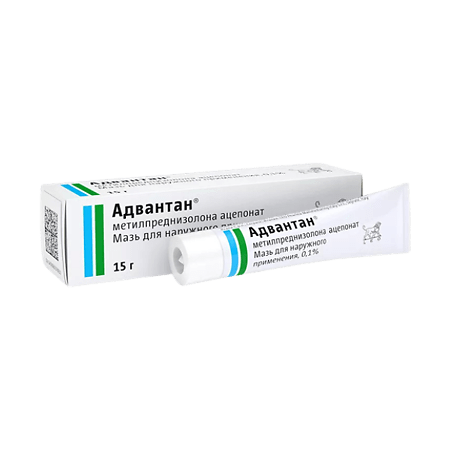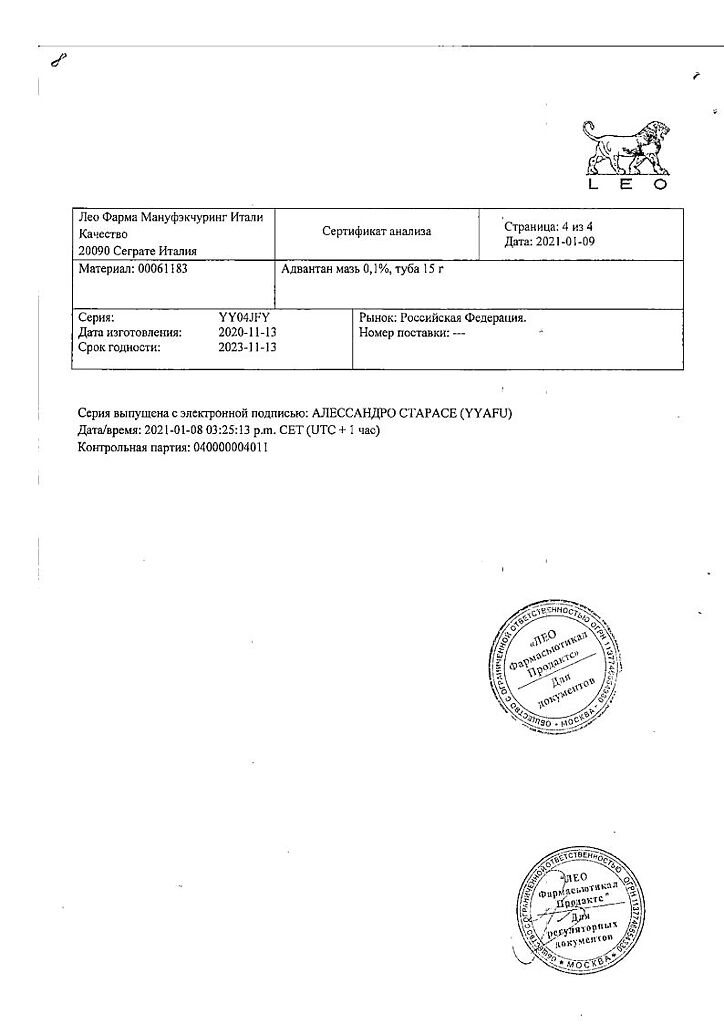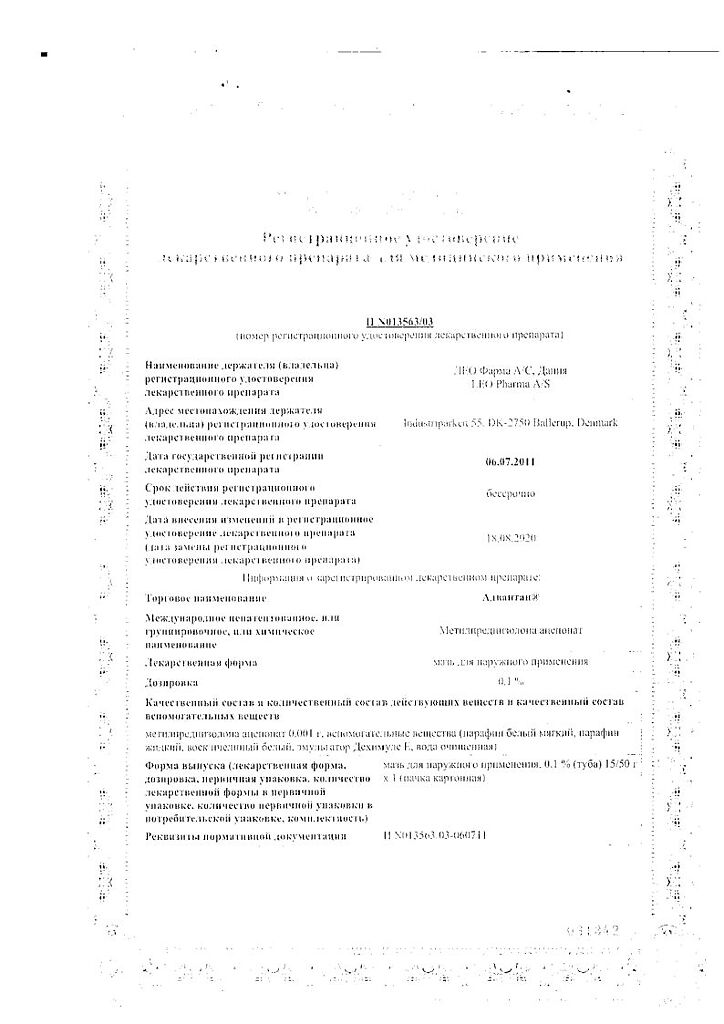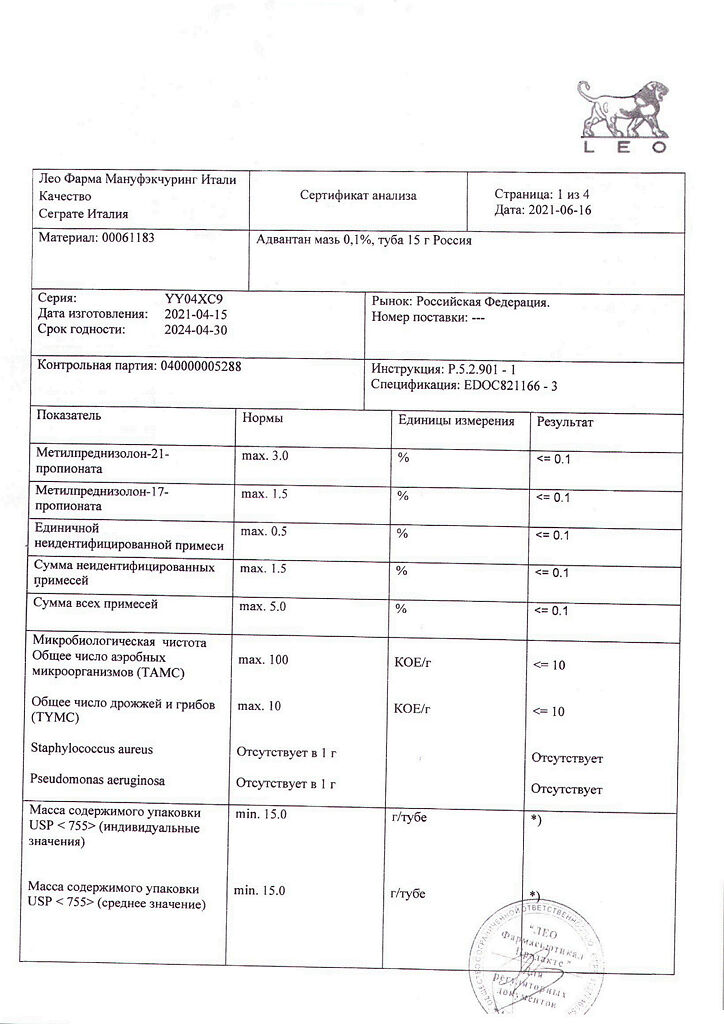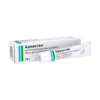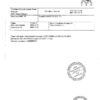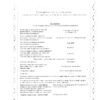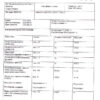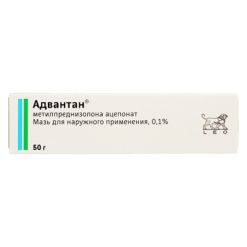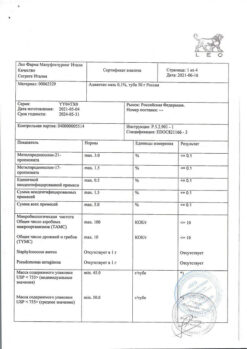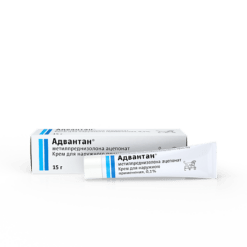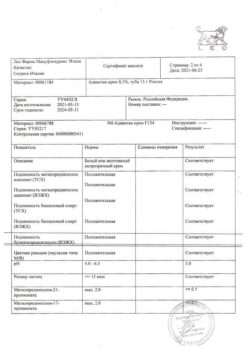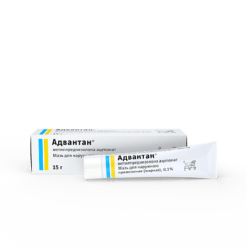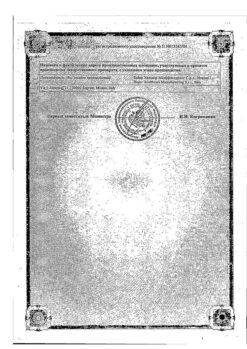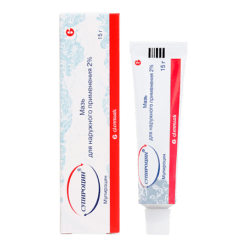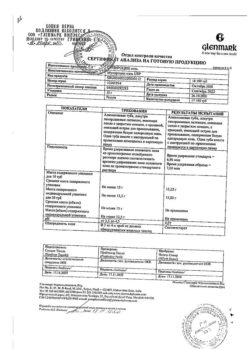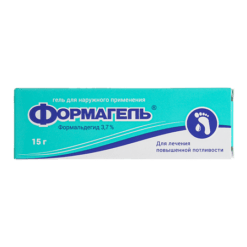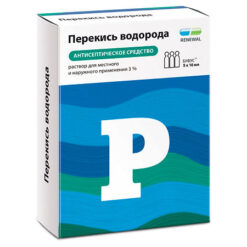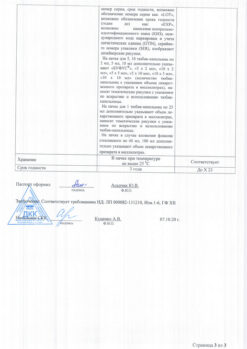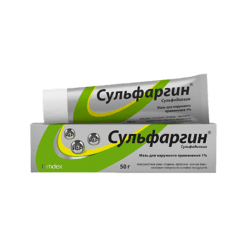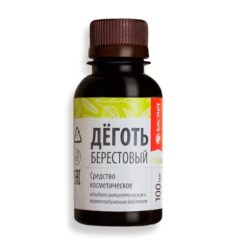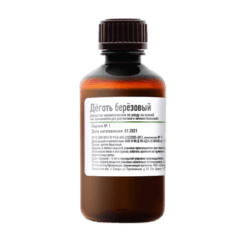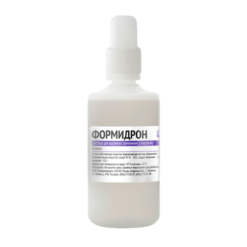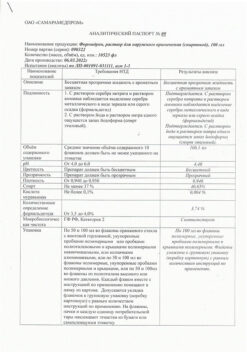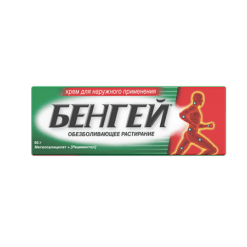No products in the cart.
Advantan®, 0.1% 15 g ointment
€19.76 €18.02
Description
Advantan is a glucocorticoid, anti-allergic, anti-inflammatory.
Pharmacodynamics
The active ingredient of the drug Advantan – methylprednisolone aceponate – is a nonhalogenated steroid. When applied topically, Advantan® suppresses inflammatory and allergic skin reactions, as well as reactions associated with increased proliferation, which leads to a reduction of objective symptoms of inflammation (including erythema, edema, mucous) and subjective sensations (including itching, irritation, pain).
When methylprednisolone aceponate is applied topically at the recommended dose, systemic effects are minimal in both humans and animals. No adrenal dysfunction is noted after multiple application of Advantan® over large surfaces (40-60% of skin surface) and also after application under an occlusive dressing: plasma cortisol levels and its circadian rhythm remain within normal limits, there is no reduction of cortisol levels in daily urine.
In clinical studies, use of Advantan® up to 12 weeks in adults and up to 4 weeks in children (including infants) showed no evidence of skin atrophy, telangiectasia, stricture or acne-like eruptions.
Methylprednisolone aceponate (especially its main metabolite, 6α-methylprednisolone-17-propionate) binds to intracellular GCS receptors. The steroidreceptor complex interacts with certain DNA sites of the immune response cells, thus causing a series of biological effects. In particular, binding of the steroidreceptor complex to the DNA of the immune response cells leads to induction of macrocortin synthesis. Macrocortin inhibits the release of arachidonic acid and thus the formation of inflammatory mediators like PG and LT.
The inhibition of GCS synthesis of vasodilatory PGs and potentiation of the vasoconstrictor effect of adrenaline, lead to a vasoconstrictor effect.
Pharmacokinetics
Methylprednisolone aceponate is hydrolyzed in the epidermis and dermis. The main and most active metabolite is 6α-methylprednisolone-17-propionate, which has significantly higher affinity for skin GCS receptors, indicating its bioactivation in the skin.
The intensity of percutaneous absorption for ointment and cream depends on the skin condition, dosage form and method of application (on the exposed skin or under the occlusive dressing). Percutaneous absorption in children and adults with atopic dermatitis (neurodermatitis) and psoriasis was not more than 2.5%, which was only slightly higher than in healthy volunteers (0.5-1.5%).
After entering the systemic bloodstream, 6α-methylprednisolone-17-propionate rapidly conjugates with glucuronic acid and is thus inactivated as 6α-methylprednisolone-17-propionate-21-glucuronide. Metabolites of methylprednisolone aceponate are eliminated mainly by the kidneys with a T1/2 of about 16 hours. Methylprednisolone aceponate and its metabolites do not cumulate in the body.
Indications
Indications
Skin diseases (including chronic ones), amenable to treatment with GCS for external use, in adults and children aged 4 months and older:
Atopic dermatitis, neurodermatitis.
True eczema.
Contact dermatitis.
Allergic dermatitis.
Dyshidrotic eczema.
Microbial eczema.
Degenerative eczema.
Pharmacological effect
Pharmacological effect
Advantan – glucocorticoid, antiallergic, anti-inflammatory.
Pharmacodynamics
The active component of Advantan, methylprednisolone aceponate, is a non-halogenated steroid. When applied externally, Advantan® suppresses inflammatory and allergic skin reactions, as well as reactions associated with increased proliferation, which leads to a reduction in objective symptoms of inflammation (including erythema, swelling, weeping) and subjective sensations (including itching, irritation, pain).
When methylprednisolone aceponate is used topically at the recommended dose, the systemic effect is minimal in both humans and animals. After repeated application of Advantan® to large surfaces (40–60% of the skin surface), as well as application under an occlusive dressing, no dysfunction of the adrenal glands is observed: the level of cortisol in plasma and its circadian rhythm remain within normal limits, and there is no decrease in the level of cortisol in daily urine.
During clinical studies, when using the drug Advantan® for up to 12 weeks in adults and up to 4 weeks in children (including young children), the development of skin atrophy, telangiectasia, stretch marks and acne-like rashes was not detected.
Methylprednisolone aceponate (especially its main metabolite, 6α-methylprednisolone-17-propionate) binds to intracellular GCS receptors. The steroid receptor complex interacts with specific regions of the DNA of immune response cells, thereby causing a series of biological effects. In particular, binding of the steroid receptor complex to DNA cells of the immune response leads to the induction of macrocortin synthesis. Macrocortin inhibits the release of arachidonic acid and thereby the formation of inflammatory mediators such as PG and LT.
GCS inhibition of the synthesis of vasodilating PGs and potentiation of the vasoconstrictor effect of adrenaline lead to a vasoconstrictor effect.
Pharmacokinetics
Methylprednisolone aceponate is hydrolyzed in the epidermis and dermis. The main and most active metabolite is 6α-methylprednisolone-17-propionate, which has a significantly higher affinity for GCS receptors in the skin, which indicates the presence of its bioactivation in the skin.
The intensity of percutaneous absorption for ointments and creams depends on the condition of the skin, dosage form and method of application (on an open area of skin or under an occlusive dressing). Percutaneous absorption in children and adults with atopic dermatitis (neurodermatitis) and psoriasis was no more than 2.5%, which is only slightly higher than in healthy volunteers (0.5–1.5%).
After entering the systemic circulation, 6α-methylprednisolone-17-propionate is rapidly conjugated with glucuronic acid and is thus inactivated in the form of 6α-methylprednisolone-17-propionate-21-glucuronide. Metabolites of methylprednisolone aceponate are eliminated mainly by the kidneys with a half-life of about 16 hours. Methylprednisolone aceponate and its metabolites do not accumulate in the body.
Special instructions
Special instructions
In the presence of bacterial dermatoses and/or dermatomycosis, in addition to Advantan therapy, it is necessary to carry out specific antibacterial or antifungal treatment.
Avoid contact of the drug with the eyes.
As with the use of systemic corticosteroids, glaucoma may develop with topical use of corticosteroids (for example, after high doses or very long-term use, use of occlusive dressings, or application to the skin around the eyes).
Impact on the ability to drive vehicles and operate machinery
Does not affect the ability to drive vehicles or operate machinery.
Active ingredient
Active ingredient
Methylprednisolone aceponate
Composition
Composition
1 g ointment contains:
Active ingredient:
methylprednisolone aceponate 1 mg.
Excipients:
white soft paraffin – 350 mg,
liquid paraffin – 239 mg,
white beeswax – 40 mg,
emulsifier Dehimuls E – 70 mg,
purified water – 300 mg.
Contraindications
Contraindications
Hypersensitivity to the components of the drug;
tuberculous or syphilitic processes in the area of application of the drug;
viral diseases (for example, chickenpox, herpes zoster) in the area where the drug is applied;
rosacea, perioral dermatitis in the area of application of the drug;
skin reactions to vaccination in the area where the drug was applied;
children’s age (up to 4 months).
Side Effects
Side Effects
The drug is usually well tolerated.
Very rarely (in less than 0.01% of cases) local reactions may be observed, such as itching, burning, erythema, and the formation of a vesicular rash.
If the drug is used for more than 4 weeks and/or on an area of 10% or more of the body surface, the following reactions may occur: skin atrophy, telangiectasia, stretch marks, acneiform skin changes, systemic effects due to corticosteroid absorption.
In clinical studies, none of the above side effects were noted when using Advantan for up to 12 weeks in adults and up to 4 weeks in children.
In rare cases (0.01-0.1%), folliculitis, hypertrichosis, perioral dermatitis, skin depigmentation, and allergic reactions to one of the components of the drug may occur.
Interaction
Interaction
Drug interactions with Advantan have not been described.
Overdose
Overdose
When studying the acute toxicity of methylprednisolone aceponate, no risk of acute intoxication was identified with excessive single external use (applying the drug over a large area under conditions favorable for absorption) or unintentional ingestion.
Symptoms: with excessively long and/or intensive local use of GCS, skin atrophy (thinning of the skin, telangiectasia, striae) may develop.
Treatment: drug withdrawal.
Storage conditions
Storage conditions
At a temperature not exceeding 25 °C
Shelf life
Shelf life
3 years
Manufacturer
Manufacturer
LEO Pharma Manufacturing Italy S.r.l., Italy
Additional information
| Shelf life | 3 years |
|---|---|
| Conditions of storage | At a temperature not exceeding 25 °C |
| Manufacturer | LEO Pharma Manufacturing Italy S.r.l., Italy |
| Medication form | topical ointment |
| Brand | LEO Pharma Manufacturing Italy S.r.l. |
Other forms…
Related products
Buy Advantan®, 0.1% 15 g ointment with delivery to USA, UK, Europe and over 120 other countries.

